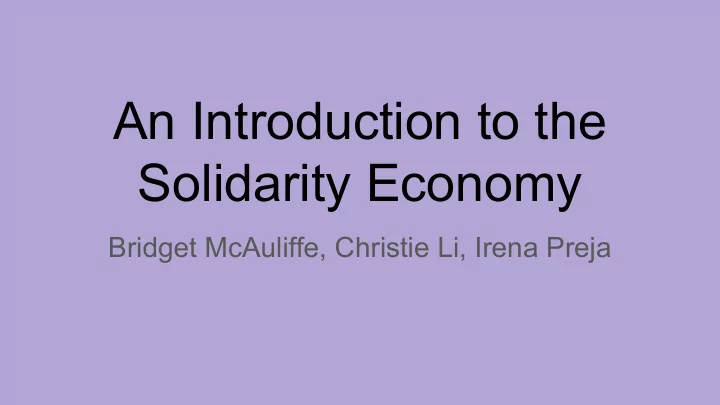

An Introduction to the Solidarity Economy Bridget McAuliffe, Christie Li, Irena Preja
Overview ● What is the Solidarity Economy? ● 11 Inequality Processes ● 7 Solidarity Processes ● Critiques of Neoliberalism ● Introduction to the Solidarity Economy ○ Mindful Consumption ○ Finance ○ Production (co-ops) ● Discussion Questions
What is the Solidarity Economy? A solidarity economy is based on local and governmental efforts and policies that seek to increase the quality of life for everyone, regardless of class, gender, race, ethnicity, age, ability, religion, sexuality.
The Inequality Processes 1. Categorization 2. Ascription 3. Polarization 4. Stratification 5. Essentialism Source: Matthaei, Ch.3 Inequality Paradigm
Inequality Processes (cont.) 6. Domination/Subordination 7. Violence 8. Rationalization 9. Institutionalization 10. Internalization 11. Stigmatization Source: Matthaei, Ch.3 Inequality Paradigm
The Seven Solidarity Processes 1. Questioning/Envisioning 2. Equal Opportunity 3. Valuing the Devalued 4. Integrating 5. Discernment 6. Integrating 7. Combining Solidarity Processes that Challenge Entire Inequality Paradigm
Why We Need the Solidarity Economy Critiques of Neoliberalism: ● Disregard for the way in which historical events have disproportionately affected different groups ● Political corruption - money power ● False claim of objectivity and rationality ● Perfect competition model; Monopolies and monopsonies ● Biased definition of success and efficiency; high GDP ≠ high standard of living
Critiques of Neoliberalism (continued): ● Assumption that wages = marginal productivity of labor, so poor = lazy ● Profit maximization as a priority ● Disregard for negative externalities caused by the profit motive ● Individual vs Community ● Perfect information assumption, even though most of the press is owned by billionaires ● Ignoring the existence of theories that are not neoclassical
Introduction to the Solidarity Economy ● Mindful Consumption ● Finance ● Production
Mindful Consumption ● Minimizing consumption: Focus on basic necessities ● Collective Focus: Consume with the longevity of the community and planet ● Durable and upgradable, not obsolete ● Community-based spaces: Participate in cohousing, shared spaces, and common goods
Finance in the Solidarity Economy “Social solidarity financing is not about amounts of money, but it is any mobilization of people’s resources and capacities which enables us to reconstruct our society around new fundamental values: the fact that, in practice, we care for each other.” - Jean Fabre, international consultant Public local banks - low interest rates, investment in local social programs and development, decentralization of economic and political power Examples: ● The Bank of North Dakota ● Postal Service as a public infrastructure bank
Production (co-ops) ● Housing cooperative ● Food cooperatives ● Cooperative day care centers
Discussion Questions 1. Which of the inequality and solidarity processes relate most to your everyday life? 2. In a strongly neoliberal society, how can we instill a shift towards cooperation and solidarity? 3. What are some ways you could contribute to the solidarity economy?
Recommend
More recommend